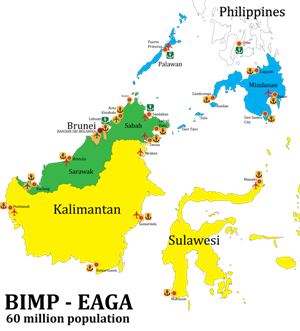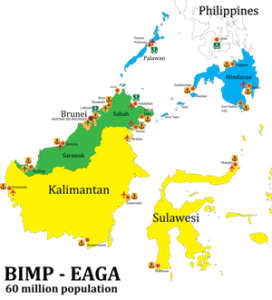The Mindanao Development Authority (MinDA) is backing plans to revive barter trading, particularly between Bangsamoro areas and the Brunei Darussalam, Indonesia, Malaysia, the Philippines-East ASEAN Growth Area (BIMP-EAGA) as part of efforts to establish competitive trade in the island region.
MinDA is set to include barter trade among its priority initiatives under the Tawi-Tawi Special Economic and Freeport Zone program and the Bangsamoro Development Corridor, with the main goal of propelling economic activities particularly in the Bangsamoro island-provinces.
“The revival of the barter trade will not only help create jobs and business opportunities for the Bangsamoro in Mindanao, but will also provide better options for them in their pursuit for better life, enhance agro-industrial productivity, and promote trade and commerce between and among the member countries of EAGA,” MinDA chairman Datu Hj. Abul Khayr Alonto, who also sits as the Philippine signing minister for BIMP-EAGA, said in a statement.
He added that encouraging productive and regulated activities in the area will discourage lawlessness associated with border towns, and strengthen security through the upgrading of customs, immigration, quarantine, and security facilities.
“The special ecozone where barter trade is one of the economic activities, has a deep socio-cultural objective that is linked with the intent to secure areas in Mindanao against transnational crimes and the threats of international terrorism,” Alonto said.
The Tawi-Tawi Special Economic and Freeport Zone also supports Mindanao and the Philippines’ bid to become a stronger economic player in the EAGA and the Association of Southeast Asian Nations (ASEAN) bloc.
A barter trade zone will allow Mindanaoan businessmen to trade with neighboring islands and sell imported items within the region without tariff duties. MinDA said President Rodrigo Duterte himself highlighted the establishment of barter trading in Mindanao as one of his priority projects, directing relevant agencies to come up with policies pushing for the resumption of such activities, primarily in the island provinces.
MinDA is sought to play a major role in the trade arrangement considering its function as the Philippine coordinating office for the BIMP-EAGA.
According to a previous study facilitated by MinDA, it has been recognized in the BIMP-EAGA level that a significant portion of intra-EAGA trade is informal trade carried out by native traders primarily from Western Mindanao using unconventionally sized ships.
“There is a need to find the best operational model with a pragmatic set of guidelines on how to gradually transition from current system to formal trade in Mindanao,” the study recommended.
A proposed executive order creating the Barter Trade Facilitation Center is currently going through a series of consultations organized by the Department of Trade and Industry and supported by MinDA.
The proposed directive, once approved, will lay the framework for implementing the barter trade system covering Mindanao and Palawan, with a governance board to propose applicable barter trade protocols that have been recommended for adoption.






